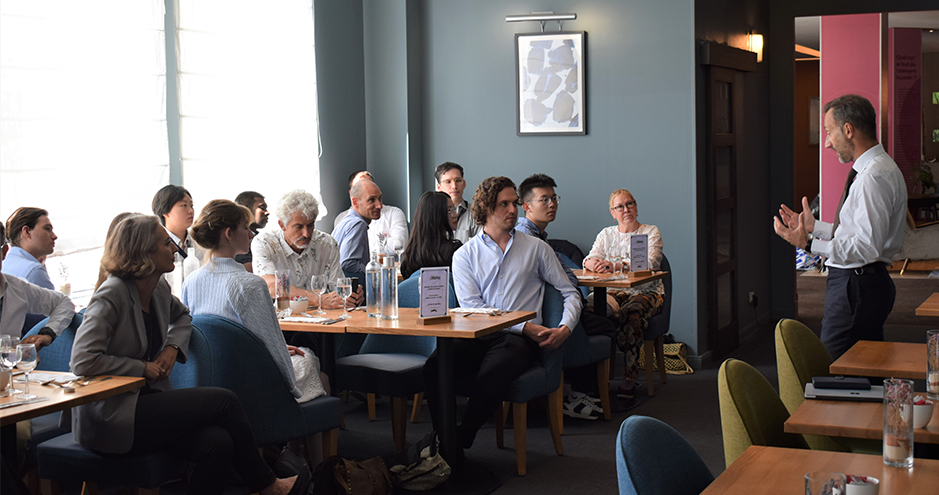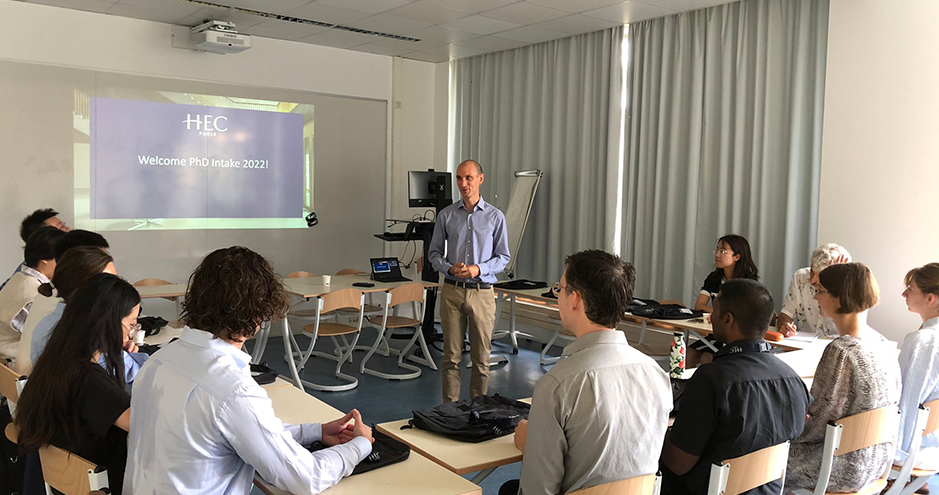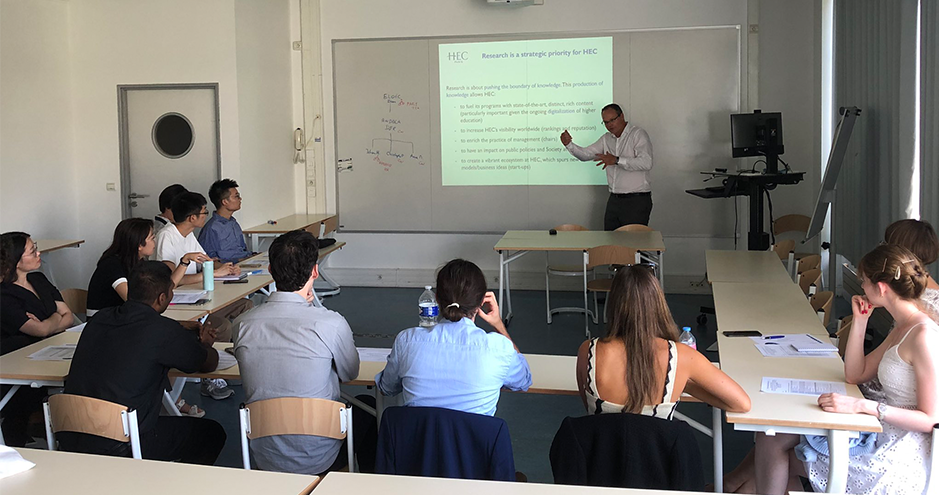PhD Freshmen at HEC Paris Tackle Important Societal Issues
10 new doctoral students joined the ranks of HEC researchers in September 2022, bringing the total number of PhD candidates to 55. HEC PhD Program Director Johan Hombert kickstarted the opening day of the first year’s HEC experience, which included warm words of greeting from Dean Eloïc Peyrache, Associate Dean for Research, Christophe Pérignon and Dean of Faculty and Research Andrea Masini.
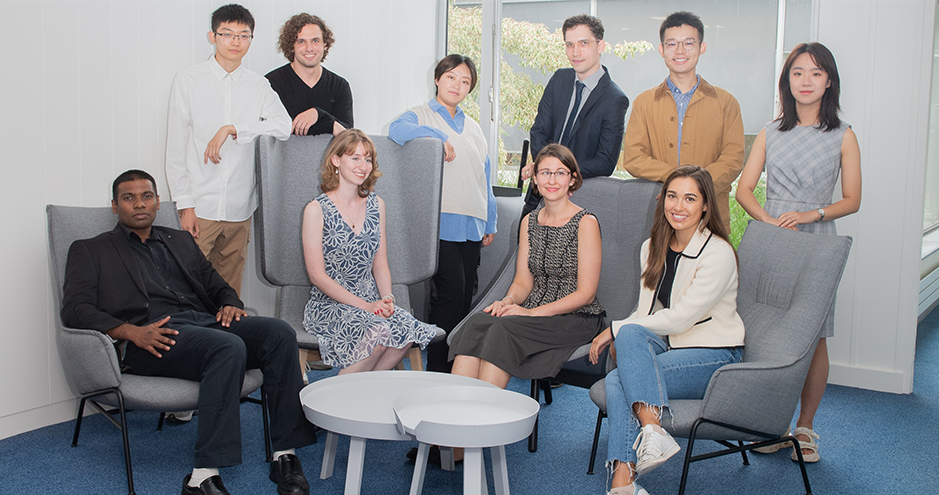
Alyssa, Andrew, Leo, Mariia, Marusa, Rui, Srinaath, Xinyu, Yang and Yujie (© CJC PHOTO)
They come from all wakes of life and geographical horizons. Leo in Chicago has helped build a NASA-funded infrared camera to observe cloud coverage. Maruša of Slovenia spent a year closely following the OECD’s Private Finance for Sustainable Development activities. Mariia has been serial degree collector in France and her native Russia. Indian engineer Srinaath has contributed his analytical skills to Apple operations in Singapore. Whilst Qinghai-born Rui presented weekly studies on China’s environmental history and green finance.
Yet, all five have put these experiences behind them, or on pause, as part of the 10-strong PhD freshmen group embarking on their HEC experience. The five men and five women decided to stake the next half-dozen years on a doctoral track they believe will open up new horizons in their already-rich careers. “If you want something new, you have to stop doing something old,” notes South African student Andrew Montandon, quoting Austrian American guru Peter Drucker. This attitude resonated strongly with the words of welcome from Eloïc Peyrache on September 5. The school Dean underlined the long-term relationship HEC builds with its doctoral students. “You are very special to us, as we seek to enrich our research network across departments. You are embarking on a long journey and we are here to help you. During this journey, expect healthy criticism of your work because we like to challenge theories, methodology and approaches. This might be tough at times, but it’s the best way to improve!”
The new HEC Dean of Faculty and Research, Andrea Masini, further underlined these points in his own welcome speech: “You are a special group and we will be treating you more as colleagues than students, a central cog in our engine of knowledge. Your fresh visions and approaches bring alive our research and your success is HEC’s success.” Masini’s Associate Dean of Research, Christophe Pérignon made the link between research and societal implementation: “Your doctoral research is all about pushing back the boundaries of knowledge,” he said. “It allows HEC Paris to enrich the practice of management and to have an impact on public policy and society at large.”
Such impact has recently been seen as doctoral students, both present and past, are rewarded for their groundbreaking work. HEC PhD alumnus Elena Plaksenkova, for example, was rewarded by her peers this summer for her work on the evolution of the anti-HIV drug ecosystem. While the European Finance Association has just rewarded the fifth-year HEC doctoral student Maxime Bonelli for his study on the effects of AI adoption by venture capitalists.
Research with Societal Impact
Bonelli’s previous experiences as a researcher are echoed by several doctoral freshmen who arrived at the HEC campus in September. Andrew Montandon worked for years as a strategy researcher and has put the exploration of the self at the heart of his work. He hopes to pursue this approach at HEC in order to “synthesize (the world’s) complexity into memorable ideas and theories.” He was drawn to the school because of the excellent placement record among alumni. “And I was also impressed by the dense body of expert researchers working in my subject area,” the Capetonian adds.
Could Montandon’s studies complement the research by fellow-freshman Mariia Lobanova? Lobanova is a Russian specialist in the cultural and creative industries and hopes her HEC doctoral studies will allow her to better understand how AI impacts consumer behavior, integrating neuro-scientific and cultural theories in her research. In parallel, fellow freshman Leo Allen is keen on studying how gossip propagates across self-contained network communication ecosystems. For example, how do catastrophes such as COVID 19 impact information sharing and people’s behavior, he wonders?
Yang Cao, meanwhile, will spend the coming years exploring aspects of consumer judgment and the decision-making process which could make a difference to human well-being and societies. Cao is one of four freshmen from China who have joined the PhD program this year. Another, Rui Li, has already enjoyed the tutorship of HEC academics Tomasz Michalski and Eric Mengus in her ongoing studies of economics and decision making topics. While she will continue explorations in these fields for her PhD, Alyssa Rusonik is likely to focus on research related to applied microeconomics and financial history. “These subjects have something almost magical about (them),” she notes. “It has been like getting to examine the clockwork mechanism on which the world operates – in every newspaper headline there seems to be a reflection of what I’ve learned in class.”
Strengthening the HEC PhD Community
All these students will be growing a close-knit PhD community which came together days later during a social exchange organized by the school’s Doctoral department kingpins Britta, Françoise and Jacqueline. Over cheese and wine, they discussed with the likes of third year Paul Bliot, fifth year Camille Doche and fourth year Bianca Crivellini. Bliot has juggled his research on the ambivalence of retributive justice for whistleblowers - with organizing a highly effective social network for HEC doctoral students of all years. Doche has just returned from a highly productive sojourn at the Wharton School to further her research on wine cooperatives and jointly-owned resources. Whilst Crivellini has enjoyed a couple remarkable years researching the community of drag queens in Milan, Italy. This is part of her PhD work on how multiple identities can contribute positively to improving the professional abilities of people as diverse as lawyers, designers and accountants. Crivellini’s collaboration with her HEC supervisor Daniel Newark, by the way, has already resulted in the publication by the Academy of Management’s proceeding of a presentation entitled “Dancing with Myself”.
Such breakthroughs can only inspire the 10 PhD newcomers who just penetrated HEC’s growing research circles. To maximize their research capabilities, they have access to full support from the HEC Foundation. The Foundation, represented on September 5 by its Executive Director Delphine Colson, offers all doctoral students financing throughout their five-year PhD program to “offer our students the conditions under which they can do their research at the highest academic level.”
Read also
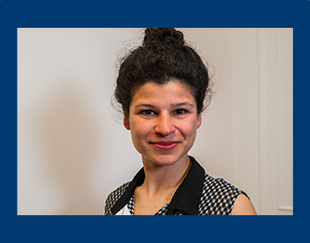
Congratulations Noémie! The European Finance Association (EFA) awards HEC PhD graduate in Finance, Noémie Pinardon-Touati, the The Engelbert Dockner Memorial Prize for the Best Paper by Young Researchers...
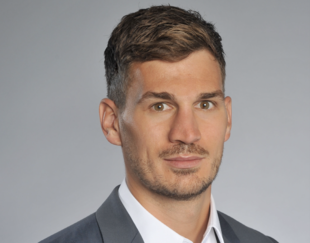
Congratulations Maxime! The European Finance Association (EFA) DT Co-Chairs awards the best paper presented at the 2022 EFA Doctoral Tutorial to Maxime Bonelli, HEC PhD in Finance.
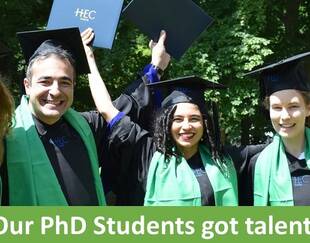
This special issue of Knowledge@HEC aims to show the excellence and diversity of the research conducted by HEC Paris PhD candidates and alumni.
